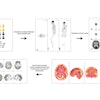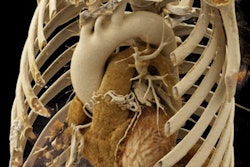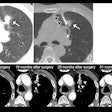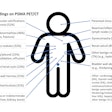Dear AuntMinnie Member,
New findings have been released that could open a new wrinkle in the debate over deposition of gadolinium from MRI contrast agents.
Researchers from California wanted to investigate why signal intensity from gadolinium deposition didn't always seem to parallel how much gadolinium patients were exposed to. They found that children with brain tumors had higher levels of gadolinium deposition than kids who also got gadolinium but didn't have brain lesions.
What do the findings mean? It could be that gadolinium deposition has a relationship to disruption in the blood-brain barrier that could result from brain tumors. But more research is necessary, the authors cautioned. Read more by clicking here, or visit our MRI Community at mri.auntminnie.com.
U.K. screening fiasco turns political
You knew it had to happen. The imbroglio in the U.K. over breast screening -- in which nearly half a million women didn't get notifications to attend their final round of screening -- has turned political.
A group of longtime mammography skeptics is taking advantage of the fiasco to push their political agenda of opposition to breast screening. The group last week issued a letter essentially telling women affected by the problem to not worry about missing breast screening, which it believes has been "overrated" and does more harm than good.
Instead, the group believes that women should wait for symptoms of breast disease to appear before they seek out any help -- we kid you not. Check out the coverage on our sister site AuntMinnieEurope.com by clicking here.
Meanwhile, health authorities in the U.K. are scrambling to respond to the crisis and handle the inquiries of thousands of women worried about the impact that missing their final screening round might have on their health. Check back on AuntMinnieEurope.com as we continue to cover this developing story.
CTC in seniors
Finally, visit our CT Community for a new story about research that examined the effectiveness of CT colonography (CTC, also known as virtual colonoscopy) as a screening tool for colorectal cancer.
The backstory behind the study is the rejection of Medicare payment for CTC screening by the U.S. Centers for Medicare and Medicaid Services (CMS), which in 2009 declined to sign off on reimbursement, saying there wasn't enough research on the technique's effectiveness in an older population.
In response, researchers from the U.S. and Italy performed a meta-analysis of 34 research studies, finding that CTC had a higher cancer detection rate for older individuals compared with younger adults. Read more by clicking here.
In other CT news, a group from Massachusetts tested the performance of an artificial intelligence algorithm for detecting pneumothorax on chest CT images. Find out how well it performed by clicking here, or visit the community at ct.auntminnie.com.



















